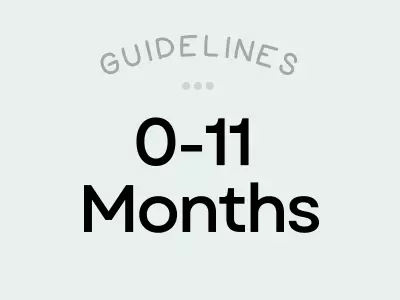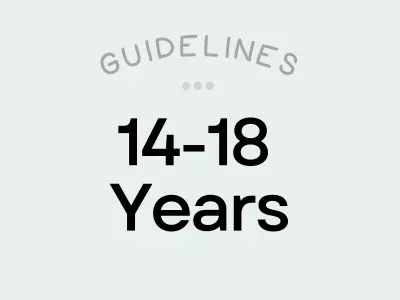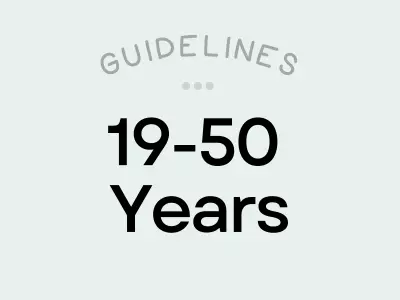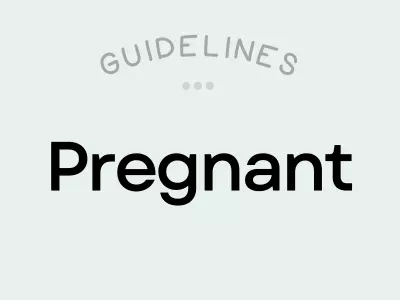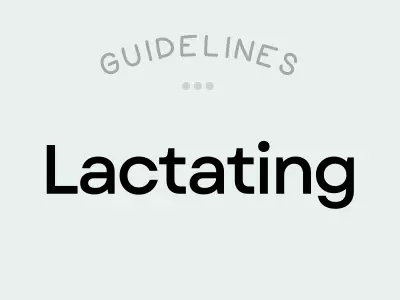Carbohydrate Requirements
| 1-3 yrs | |||
| Nutrient | RDA | AI | Upper Limit |
| Fiber (g) | 19 (12-23 mo) | Not established | |
| 14 (14g/1000 kcal) 2-3 yrs | |||
Functional Fat Requirements
| 1-3 yrs | |||
| Nutrient | RDA | AI | Upper Limit |
| ALA (g) | 0.7 | Not established | |
| EPA + DHA (mg) | 100 (DHA only) 1 yr 250 (2-3 yrs) | Not established | |
| Linoleic acid (g) | 7 | Not established | |
Mineral Requirements
| 1-3 yrs | |||
| Nutrient | RDA | AI | Upper Limit |
| Calcium (mg) | 700 | 2500 | |
| Chromium (µg) | 11 | Not established | |
| Copper (µg) | 340 | 1000 | |
| Iodine (µg) | 90 | 200 | |
| Iron (mg) | 7 | 40 | |
| Magnesium (mg) | 80 | 65 (from supplemental forms) | |
| Manganese (mg) | 1.2 | 2 | |
| Phosphorous (mg) | 460 | 3000 | |
| Potassium (mg) | 2000 | Not established | |
| Selenium (µg) | 20 | 90 | |
| Zinc (mg) | 3 | 7 | |
Protein & Amino Acid Requirements
| 1-3 yrs | |||
| Nutrient | RDA | AI | Upper Limit |
| Protein (g) | 13 | Not established | |
Vitamin & Vitamin-Like Compound Requirements
| 1-3 yrs | |||
| Nutrient | RDA | AI | Upper Limit |
| Vit A (µg RE) | 300 | 600 | |
| Vit B1 (mg) | 0.5 | Not established | |
| Vit B2 (mg) | 0.5 | Not established | |
| Vit B3 (mg) | 6 | 10 (from supplemental forms) | |
| Vit B5 (mg) | 2 | Not established | |
| Vit B6 (mg) | 0.5 | 30 | |
| Vit B7 (µg) | 8 | Not established | |
| Vit B9 (µg) | 150 | 300 (from supplemental forms) | |
| Vit B12 (µg) | 0.9 | Not established | |
| Vit C (mg) | 15 | 400 | |
| Vit D (IU/µg) | 600 IU 15 µg | 2500 IU 62.5 µg | |
| Vit E (mg) | 6 | 200 (from supplemental forms) | |
| Vit K (µg) | 30 | Not established | |
| Choline (mg) | 200 | 1000 | |
Learn What Foods Are the Best Sources of Every Nutrient
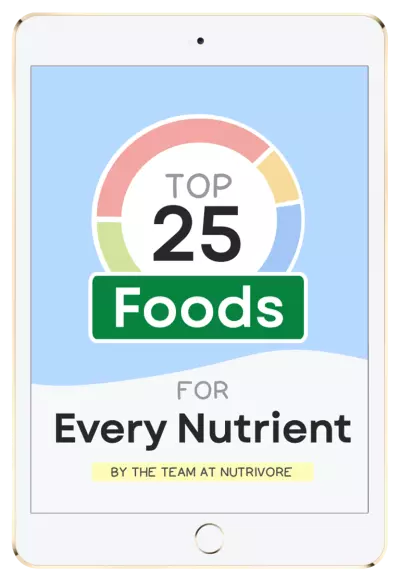
The Top 25 Foods for Every Nutrient
The Top 25 Foods for Every Nutrient e-book is a well-organized, easy-to-use, grocery store-friendly guide to help you choose foods that fit your needs of 43 important nutrients while creating a balanced nutrient-dense diet.
Get two “Top 25” food lists for each nutrient, plus you’ll find RDA charts for everyone, informative visuals, fun facts, serving sizes and the 58 foods that are Nutrient Super Stars!
Buy now for instant digital access.
Abbreviations & Definitions
To help understand all of the information presented in these tables, we’ve included this summary of abbreviations and definitions for quick reference.
ADEQUATE INTAKE (AI): Represents an amount of a nutrient assumed to ensure nutritional adequacy for everyone in the demographic group when there isn’t sufficient information to develop an RDA.
% DAILY VALUE (%DV): The percentage of the recommended daily intake for each nutrient per serving or amount of food, calculated based on a 2,000 calorie per day diet.
ESTIMATED AVERAGE REQUIREMENT (EAR): A nutrient intake value that is estimated to meet the requirement of half the healthy individuals in a particular life stage and gender group.
RECOMMENDED DIETARY ALLOWANCE (RDA): Represents the dietary intake level of a specific nutrient considered sufficient to meet the needs of 97.5% of healthy individuals. These values should be considered minimum daily targets.
RECOMMENDED TARGET (RT): Represents targets for nonessential nutrients developed based on Team Nutrivore’s review of the scientific literature established with the aim of providing improvements for overall health and reduction in chronic disease risk.
UPPER LIMITS (UL): The maximum level of daily nutrient intake that is likely to pose no risk of adverse effects. The upper limit differs from toxicity which is typically only seen in the context of supplementation and not from dietary intake of whole foods.
Nutrient Requirements for Other Groups
cITATIONS
Expand to see all scientific references for this article.
EFSA Panel on Dietetic Products, Nutrition, and Allergies (NDA). Scientific opinion on dietary reference values for fats, including saturated fatty acids, polyunsaturated fatty acids, monounsaturated fatty acids, trans fatty acids, and cholesterol. EFSA Journal. 2010;8(3):107.
European Food Safety Authority. The DRV Finder. Available at: https://www.efsa.europa.eu/en/interactive-pages/drvs. Accessed 5/24/19.
Kalhan SC. Optimal protein intake in healthy infants. Am J Clin Nutr. 2009 Jun;89(6):1719-20. doi: 10.3945/ajcn.2009.27888. Epub 2009 Apr 22. PMID: 19386742; PMCID: PMC2682990.
Food and Nutrition Board, Institute of Medicine. Biotin. Dietary Reference Intakes: Thiamin, Riboflavin, Niacin, Vitamin B-6, Vitamin B-12, Pantothenic Acid, Biotin, and Choline. Washington, D.C.: National Academy Press; 1998:374-389. (National Academy Press)
Food and Nutrition Board, Institute of Medicine. Choline. Dietary Reference Intakes: Thiamin, Riboflavin, Niacin, Vitamin B-6, Vitamin B-12, Pantothenic Acid, Biotin, and Choline. Washington D.C.: National Academy Press; 1998:390-422. (National Academy Press)
Food and Nutrition Board, Institute of Medicine. Chromium. Dietary reference intakes for vitamin A, vitamin K, boron, chromium, copper, iodine, iron, manganese, molybdenum, nickel, silicon, vanadium, and zinc. Washington D.C.: National Academy Press; 2001:197-223. (National Academy Press)
Food and Nutrition Board, Institute of Medicine. Copper. Dietary reference intakes for vitamin A, vitamin K, boron, chromium, copper, iodine, iron, manganese, molybdenum, nickel, silicon, vanadium, and zinc. Washington, D.C.: National Academy Press; 2001:224-257. (National Academy Press)
Food and Nutrition Board, Institute of Medicine. Dietary Fats: Total Fat and Fatty Acids. Dietary Reference Intakes for Energy, Carbohydrate, Fiber, Fat, Fatty Acids, Cholesterol, Protein, and Amino Acids. Washington, D.C.: National Academies Press; 2002:422-541. (The National Academies Press)
Food and Nutrition Board, Institute of Medicine. Dietary Reference Intakes for Calcium and Vitamin D. Washington, D.C.; 2011. (The National Academies Press)
Food and Nutrition Board, National Academy of Medicine. Dietary Reference Intakes for Sodium and Potassium. The National Academies of Sciences, Engineering, and Medicine. Washington, D.C.: The National Academies Press; 2019. (The National Academies Press)
Food and Nutrition Board, Institute of Medicine. Folate. Dietary Reference Intakes: Thiamin, Riboflavin, Niacin, Vitamin B6, Folate, Vitamin B12, Pantothenic Acid, Biotin, and Choline. Washington, D.C.: National Academy Press; 1998:196-305. (National Academy Press)
Food and Nutrition Board, Institute of Medicine. Iodine. Dietary reference intakes for vitamin A, vitamin K, boron, chromium, copper, iodine, iron, manganese, molybdenum, nickel, silicon, vanadium, and zinc. Washington, D.C.: National Academy Press; 2001:258-289. (National Academy Press)
Food and Nutrition Board, Institute of Medicine. Iron. Dietary Reference Intakes for Vitamin A, Vitamin K, Boron, Chromium, Copper, Iodine, Iron, Manganese, Molybdenum, Nickel, Silicon, Vanadium, and Zinc. Washington, D.C.: National Academy Press; 2001:290-393. (National Academy Press)
Food and Nutrition Board, Institute of Medicine. Magnesium. Dietary Reference Intakes: Calcium, Phosphorus, Magnesium, Vitamin D, and Fluoride. Washington, D.C.: National Academy Press; 1997:190-249. (National Academy Press)
Food and Nutrition Board, Institute of Medicine. Manganese. Dietary reference intakes for vitamin A, vitamin K, boron, chromium, copper, iodine, iron, manganese, molybdenum, nickel, silicon, vanadium, and zinc. Washington, D.C.: National Academy Press; 2001:394-419. (National Academy Press)
Food and Nutrition Board, Institute of Medicine. Niacin. Dietary Reference Intakes: Thiamin, Riboflavin, Niacin, Vitamin B-6, Vitamin B-12, Pantothenic Acid, Biotin, and Choline. Washington, D.C.: The National Academies Press; 1998:123-149. (The National Academies Press)
Food and Nutrition Board, Institute of Medicine. Pantothenic acid. Dietary Reference Intakes: Thiamin, Riboflavin, Niacin, Vitamin B6, Vitamin B12, Pantothenic Acid, Biotin, and Choline. Washington, D.C.: National Academy Press; 1998:357-373. (National Academy Press)
Food and Nutrition Board, Institute of Medicine. Phosphorus. Dietary Reference Intakes: Calcium, Phosphorus, Magnesium, Vitamin D, and Fluoride. Washington D.C.: National Academy Press; 1997:146-189. (National Academy Press)
Food and Nutrition Board, National Academy of Medicine. Potassium: Dietary Reference Intakes based on chronic disease. Dietary Reference Intakes for Sodium and Potassium. The National Academies of Sciences, Engineering, and Medicine. Washington, D.C.: National Academy Press; 2019:121-154. (The National Academies Press)
Food and Nutrition Board, Institute of Medicine. Selenium. Dietary reference intakes for vitamin C, vitamin E, selenium, and carotenoids. Washington, D.C.: National Academy Press; 2000:284-324. (National Academy Press)
Food and Nutrition Board, Institute of Medicine. Riboflavin. Dietary Reference Intakes: Thiamin, Riboflavin, Niacin, Vitamin B-6, Vitamin B-12, Pantothenic Acid, Biotin, and Choline. Washington D.C.: National Academy Press; 1998:87-122. (National Academy Press)
Food and Nutrition Board, Institute of Medicine. Thiamin. Thiamin, Riboflavin, Niacin, Vitamin B-6, Vitamin B-12, Pantothenic Acid, Biotin, and Choline. Washington D.C.: National Academy Press; 1998:58-86. (National Academy Press)
Food and Nutrition Board, Institute of Medicine. Vitamin A. Dietary Reference Intakes for Vitamin A, Vitamin K, Arsenic, Boron, Chromium, Copper, Iodine, Iron, Manganese, Molybdenum, Nickel, Silicon, Vanadium, and Zinc. Washington, D.C.: National Academy Press; 2001:65-126. (National Academy Press)
Food and Nutrition Board, Institute of Medicine. Vitamin B6. Dietary Reference Intakes: Thiamin, Riboflavin, Niacin, Vitamin B6, Vitamin B12, Pantothenic Acid, Biotin, and Choline. Washington D.C.: National Academies Press; 1998:150-195. (National Academies Press)
Food and Nutrition Board, Institute of Medicine. Vitamin B12. Dietary Reference Intakes for Thiamin, Riboflavin, Niacin, Vitamin B6, Vitamin B12, Pantothenic Acid, Biotin, and Choline. Washington, D.C.: National Academy Press; 1998:306-356. (National Academy Press)
Food and Nutrition Board, Institute of Medicine. Vitamin C. Dietary Reference Intakes for Vitamin C, Vitamin E, Selenium, and Carotenoids. Washington, D.C.: National Academy Press; 2000:95-185. (National Academy Press)
Food and Nutrition Board, Institute of Medicine. Vitamin E. Dietary reference intakes for vitamin C, vitamin E, selenium, and carotenoids. Washington, D.C.: National Academy Press; 2000:186-283. (National Academy Press)
Food and Nutrition Board, Institute of Medicine. Vitamin K. Dietary Reference Intakes for Vitamin A, Vitamin K, Arsenic, Boron, Chromium, Copper, Iodine, Iron, Manganese, Molybdenum, Nickel, Silicon, Vanadium, and Zinc. Washington, D.C.: National Academy Press; 2001:162-196. (National Academy Press)
Food and Nutrition Board, Institute of Medicine. Zinc. Dietary reference intakes for vitamin A, vitamin K, boron, chromium, copper, iodine, iron, manganese, molybdenum, nickel, silicon, vanadium, and zinc. Washington, D.C.: National Academy Press; 2001:442-501. (National Academy Press)
Phillips KM, Haytowitz DB, Pehrsson PR. Implications of two different methods for analyzing total dietary fiber in foods for food composition databases. Journal of Food Composition Analysis. 2019 Dec;84:103253. https://doi.org/10.1016/j.jfca.2019.103253
Trumbo P, Schlicker S, Yates AA, Poos M; Food and Nutrition Board of the Institute of Medicine, The National Academies. Dietary reference intakes for energy, carbohydrate, fiber, fat, fatty acids, cholesterol, protein and amino acids. J Am Diet Assoc. 2002 Nov;102(11):1621-30. doi: 10.1016/s0002-8223(02)90346-9. Erratum in: J Am Diet Assoc. 2003 May;103(5):563. PMID: 12449285.
U.S. Department of Agriculture and U.S. Department of Health and Human Services. Dietary Guidelines for Americans, 2020-2025. 9th Edition. December 2020. Available at DietaryGuidelines.gov.



